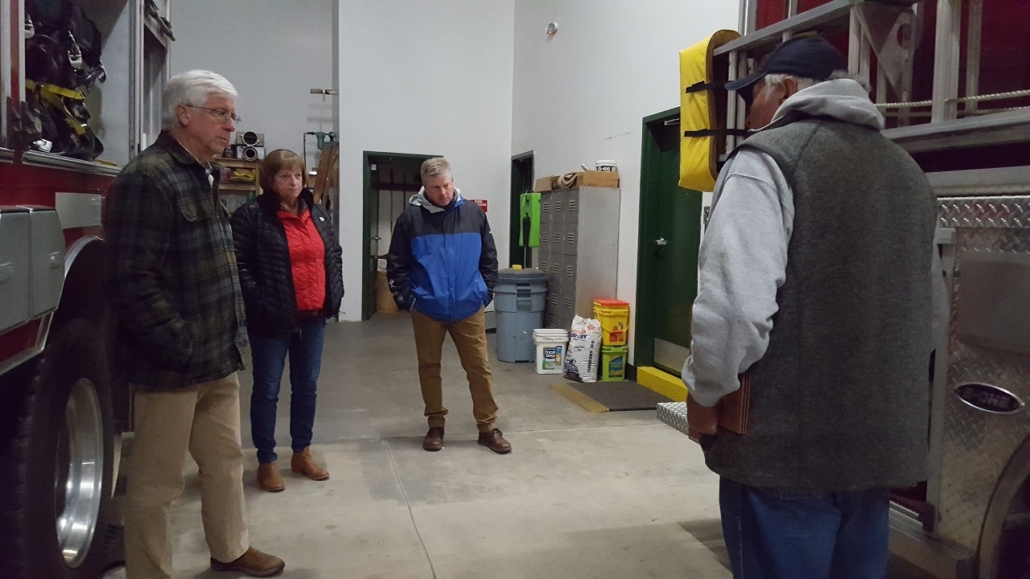China selectmen OK broadband improvement RFP
 by Mary Grow
by Mary Grow
At their Nov. 9 meeting, China selectmen approved two requests, from the Broadband Committee and the volunteer fire departments, and made several appointments.
Since the meeting was the first after voters re-elected members Ronald Breton and Janet Preston and elected Blane Casey (to succeed Donna Mills-Stevens, who did not seek another term), board members began by re-electing Breton chairman and Irene Belanger secretary.
The Broadband Committee presented a report that summarized goals and activities and asked approval to spend $5,750 to have Mission Broadband, Inc., develop a request for proposals to improve China’s internet service. Selectmen approved.
The committee’s goals, the report says, are to make broadband service available to all China residents, with better speeds and greater reliability, and to increase competition. Three internet providers currently serve the town, Consolidated Communications Inc., Hussey Communications and Spectrum.
Earlier, the committee oversaw a survey of town residents. The report says of the 308 residents who completed the survey, 20 percent did not have internet service, because it was too expensive or too slow and unreliable to be useful. Of respondents who did have service, 161 used it for working from home and 111 for education.
The volunteer firefighters want a dry hydrant included as part of the on-going causeway project at the head of China Lake’s east basin. Town Manager Rebecca Hapgood said China’s three departments all support the plan, and if the dry hydrant is west of the causeway bridge, China Baptist Church officials have expressed willingness to sign an easement if church property is affected.
The firefighters propose taking money for the dry hydrant – the estimated cost is $6,780 – from the fire department reserve fund. Since the plan so far lacks detail, selectmen approved with the condition that the departments first get the necessary permit from the Maine Department of Environmental Protection.
Appointments were approved as follows:
- Member of the General Assembly of the Kennebec Regional Development Authority (which oversees FirstPark, the Oakland business park in which China and other towns have invested), Irene Belanger; alternate member, Janet Preston.
- Members of the Broadband Committee, Robert O’Connor, Tod Detre, Raymond Robert, James Pitney and Neil Farrington.
- Members of the Transfer Station Committee, Mark Davis, Karen Hatch, Kevin Rhoades, Ronald Marois, Lawrence Sikora, Irene Belanger and Robert Kurek.
Hapgood presented reports submitted to her from town departments and the treasurer’s report. Four months into the 2020-21 fiscal year, income and expenditures are on target, she said.
The next regular China selectmen’s meeting is scheduled for Monday evening, Nov. 23. Participation in the Nov. 9 meeting was remote except for Hapgood and the five selectmen, who gathered, masked, in the portable building behind the town office; the Nov. 23 meeting is likely to follow the same pattern.


 by The Town Line staff
by The Town Line staff
 Two of the three write-in positions on China’s Nov. 3 local ballot have been filled, Town Clerk Angela Nelson reported. Trishea Story has accepted the secretaryship of the budget committee, and Elizabeth Curtis will fill the at-large budget committee seat. Each received the most write-in votes for the respective position.
Two of the three write-in positions on China’s Nov. 3 local ballot have been filled, Town Clerk Angela Nelson reported. Trishea Story has accepted the secretaryship of the budget committee, and Elizabeth Curtis will fill the at-large budget committee seat. Each received the most write-in votes for the respective position.

